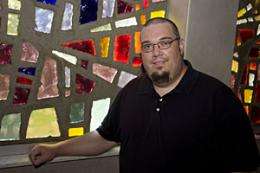Paul Anderson
(Phys.org) -- New research out of the University of Cincinnati suggests that while some religious groups are becoming more tolerant in regard to some heated social issues, all are growing increasingly more conservative in their viewpoints on legalized abortion. Paul Anderson, a University of Cincinnati doctoral student in the UC Department of Sociology, will present his research on Aug. 20, at the 107th annual meeting of the American Sociological Association in Denver.
Anderson examined 38 years of data from the General Social Survey, a nationally representative survey of Americans that has been conducted on an annual or biennial basis since 1972. The data represented 55,087 participants from 1972-2010. On a scale ranging from one to four with higher numbers representing more liberal views, Anderson examined views of religious groups on four topics: elective abortion, traumatic abortion, homosexuality and premarital sex.
Anderson also examined whether frequency of service attendance factored into dividing conservative and more liberal viewpoints on the four issues.
The GSS data centered on the following religious affiliations: Protestant, Catholic, Jewish, none and other. Protestants were divided into Fundamentalists, moderate and liberal.
On questions examining opinion on elective legal abortion, the GSS asked if it should be possible for a woman to obtain a legal abortion if:
- The family was low-income and could not afford more children
- A woman was married but did not want more children
- A woman was not married, but did not want to marry the man involved in the pregnancy
- There was a strong chance of serious defect in the fetus
- The woman became pregnant because of rape
- The woman’s own health was seriously endangered by the pregnancy
He says he also found a significant shift from 1972 to 2010 toward conservatism on opinions toward legal abortion for traumatic reasons.
However, he says the data indicates that American opinions on “whether or not homosexuality is wrong have significantly liberalized since 1972, with American opinion moving from 1.69 in the earliest average to 2.30 in the latest average. This is a shift from an average viewpoint of always or almost wrong in 1972 to almost always and sometimes wrong in 2010,” states Anderson. “While this average still indicated negative views toward gay and lesbian relationships, the data indicates that Americans are becoming more accepting of gay and lesbian sexual relationships,” says Anderson.
In addition, the data indicated a slight increase toward acceptance of premarital sex.
“I also found that church attendance matters, with the less intensely religious reporting more tolerant views than the more intensely religious,” says Anderson. He says Fundamentalists, whether active or non-active, often produced the most conservative opinions on all four issues, while Liberal Protestants, whether active or non-active, held the most progressive views on the issues. Anderson writes that Catholics, with the exception of abortion, showed indications of becoming slightly more liberal over time on the issues, compared with the other religious groups, while conservative Protestants increasingly became more conservative.
Anderson says his future research will add geographic locations to examining whether Americans are becoming more polarized on divisive social issues.
Provided by University of Cincinnati


















